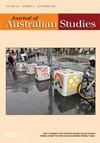“在成为女人之前我是中国人,还是先成为女人?”:布莱恩·卡斯特罗《花园之书》中的性别与种族忧郁症
IF 0.4
3区 历史学
Q3 AREA STUDIES
引用次数: 0
摘要
《花园书》中的女主人公既是想象和象征幻想的场所,又是忧郁的现实。在这篇文章中,我探讨了一个华裔澳大利亚女性是如何陷入种族和性别差异的忧郁境地的,以及布莱恩·卡斯特罗是如何通过他的刻画解构种族、性别和国家等身份标志的。斯旺在澳大利亚出生和长大,是合法的澳大利亚公民。然而,她的亚洲外表和性别认同损害了她作为澳大利亚民族国家主体的合法性。澳大利亚华裔女性作为东方女性气质的意象和幻想,成为一个幽灵,一个萦绕在澳大利亚白人历史和记忆中的“他者”。卡斯特罗的作品展示了种族和性别差异如何建构和解构身份,无论是个人还是国家。在斯旺的案例中,源自帝国主义的性别种族化破坏了国家公民身份的一致性。这篇文章通过斯旺生活中男人的眼睛来解读她的性格,提供了一个可供选择的场所,在这里,白人澳大利亚所排斥、否认和丢失的东西变得清晰可见。斯旺的种族和性别忧郁让我们看到了文化本质主义和民族主义核心的帝国暴力和殖民色情。本文章由计算机程序翻译,如有差异,请以英文原文为准。
“Am I Chinese before I am a woman or am I a woman first?”: Gender and Racial Melancholia in Brian Castro's The Garden Book
ABSTRACT The female protagonist in The Garden Book is the site of both imaginary and symbolic fantasy, as well as the melancholic real. In this article, I explore how a Chinese-Australian woman comes to inhabit a melancholic position of racial and gendered difference, and how Brian Castro, through his portrayal, deconstructs identity markers such as race, gender and nation. Born and raised in Australia, Swan is a legitimate Australian citizen. However, her Asian appearance and gender identity compromise her legitimacy as a subject of the Australian nation-state. The Chinese-Australian woman as image and fantasy of Oriental femininity becomes a spectre, an “Other” haunting the history and memory of white Australia. Castro’s writing shows how racial and sexual difference constructs and deconstructs identity, individual as well as national. In Swan’s case, gendered racialisation derived from imperialism disrupts the coherence of national citizenship. Reading the character of Swan as presented through the eyes of the men in her life, this article provides an alternative site where what is excluded, disavowed and lost in white Australia becomes visible. Swan’s racial and gendered melancholia allows us to see imperial violence and colonial eroticism at the heart of cultural essentialism and nationalism.
求助全文
通过发布文献求助,成功后即可免费获取论文全文。
去求助
来源期刊

Journal of Australian Studies
Multiple-
CiteScore
0.90
自引率
20.00%
发文量
56
期刊介绍:
The Journal of Australian Studies (JAS) is the journal of the International Australian Studies Association (InASA). In print since the mid-1970s, in the last few decades JAS has been involved in some of the most important discussion about the past, present and future of Australia. The Journal of Australian Studies is a fully refereed, international quarterly journal which publishes scholarly articles and reviews on Australian culture, society, politics, history and literature. The editorial practice is to promote and include multi- and interdisciplinary work.
 求助内容:
求助内容: 应助结果提醒方式:
应助结果提醒方式:


